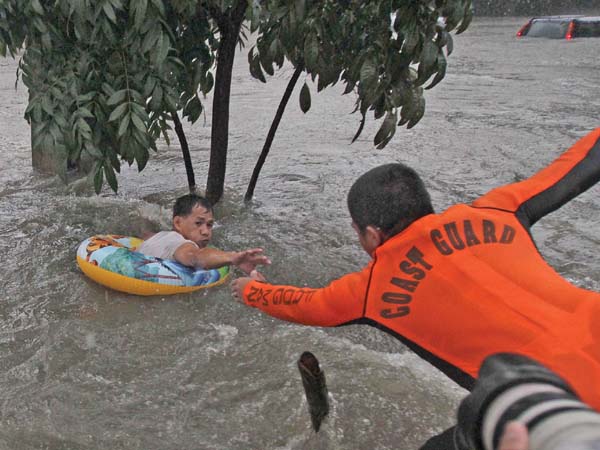



It is such a balm in the heart to see volunteers and people all across the country and Filipinos all around the world help our fellowmen in this time of need.(Click the following to direct you to links on how to help RED CROSS, CEBU DONATIONS). In times like these, indeed we are a nation of loving and caring people. We are a nation of heroes.
But it is always a recurring question in my mind: What happens when the water levels go down? What happens when the sun goes up? What happens when the relief goods are distributed and everyone else goes back to their own homes after the flood has gone-- what happens then? Should we be waiting for another flood? Should we rely that we have a lot of caring fellowmen who would come to the rescue with mediocre rescue equipment but too much heart?
I dare say this: Isn't it more of a heroism if we do our part every day to prevent these things from happening? Isn't it more worthwhile that, together, as a nation, we help each other build a better world and a better Philippines?
I have posted in my Facebook status earlier that much as I am saddened by the photos of Luzon?s predicament, what we can offer right away are prayers. However, we cannot always depend on prayers alone on times like these. We have to do our part, in whatever way we can, in the prevention of catastrophic events.
What do we mean by we?? ?We? means A BIG PART of YOU (yes you) and ME doing our very own share of flood prevention starting in our own homes. "We" also means the support of our government officials and other organizations to help out. In other words, let us try not to depend on the government alone to solve our problems. After all, these things can be doable if we have the same mindset. And that mindset starts in us.
So we ask, how can we help manage the risks of flooding more effectively?

More Trees and Woodland Conservation: This is of paramount importance. First, trees provide shade and shelter. That's very basic. Another basic usage is that it provides us needed oxygen to breathe. Most importantly in connection with the flooding, trees act as sponges as it absorbs excess water and facilitates in the prevention of flood. It is ironic to note that the Philippines was once noted to have very plush greenery and woodland. However, due to a lot of housing and commercial developments, trees are being cut down.
So, how can they protect us now that they are being cut down? Keep the balance. Conserve wooded/forest areas rather than sell it off to the highest bidder (hello, government?) I know this may be a hopeless case but for me, it?s just common sense. Or how about requiring those companies to replace what they have taken in other areas? Or whatever. I'm just jabbering here but for sure, there are so many ways than just saying yes to big bucks and sacrificing our trees.
What can we do in our way? Try to surround your areas (houses, offices, nearby provinces, etc.) with trees! Plant, plant and plant! Tree planting programs should be aplenty, and should be done with much heart for the future generation, not just for show or for some company activity to be taken out of the annual checklist.
Eradicate blocked drainages: Have you ever wondered why even after a few short bursts of rain, certain areas become flooded very easily? Well, the answer mainly goes back to poor drainage systems. What makes these systems poorer is that most of our drainages are blocked by trash, garbage, paper, cigarette butts, candy wrappers, dried leaves, paper, plastic, -- you get my drift. These things will prevent water from escaping effectively at times when there are heavy rainfalls causing low level flooding in general.
What can we do in our own way?
? Segregate your trash properly starting at your own home.
? Avoid littering in public areas. Do not throw away your wrappers and other trash in the streets
? Be mindful of your surrounding areas and pick up debris if you can. Be mindful of the trash you get out, for they say, they will come back to you in one way or another.
? Educate your kids with good public sanitation and in cleaning the surroundings.
? Recycle trash. There are many government programs and other programs by LGUs, NGOs and other organizations that are catering to this. You might want to check that out as well.
Flood Contingency Plans- Before the floods come in, contingency plans should be made, especially if you are in a flood prone area. Ask your local government units on what their plans are; suggest ideas on how to improve the flood protection systems in your areas.
What to do Personally: Try using sandbags to absorb excess flood water. Scout your surrounding areas and make a plan on what to do. Prepare flood survival kits.
Take Good Care of Mother Nature. It all boils down to the love of mother nature. If you love nature, it will love you back. Sad to say, most of the floods would go back to what humankind has been doing from the past and present generations. Good thing is, we can still do something about it. It's never too late to do our own share.
Mag iSTORYA Ta (Let's talk!) What do you have in mind? What can we do to prevent catastrophic calamities such as flooding? You can also post here on how else we can help now.
-thisbe.ara-





 Sections
Sections Recent Articles
Recent Articles

vBulletin Message